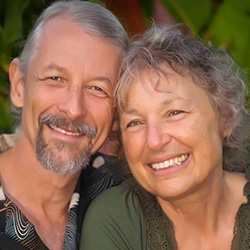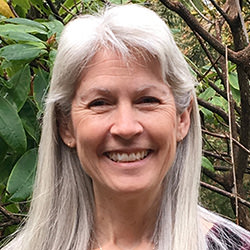

Search Results: feelings
-
What does nonviolence have to do with group facilitation?
Miki Kashtan believes that nonviolence is a way of being and living that orients us in all our thoughts, words and deeds toward the integration of truth, love and courage. All nonviolent individual and collective actions are aimed at preserving what serves life and challenging what does not. Facilitation is one clear path for bringing nonviolence to the world!
How can we act now, as facilitators, as if the world of our dreams, the Beloved Community, is already in place?
-
Join Dian Killian and discover the power of imagery and metaphor in deepening your empathy practice. This segment from her 6 session course explores how visualizing sensations, emotions, and needs through metaphorical language can enhance the connection during empathy guessing, particularly in somatic-based approaches.
-
- Discover the healing magic that comes from welcoming pain rather than avoiding it
- Learn how to navigate ‘healing dialogues’ when hurt or pain is present
- Increase your empathy/honesty skills and your ability to navigate painful conversations
- Embrace pain as a precious life-guiding force that teaches us how to be together!
-
-
-
NVC trainer Sarah Peyton explores the process of repairing relationships through the lens of Nonviolent Communication. She emphasizes the importance of self-connection and empathy—both for ourselves and others—when addressing moments of hurt or disconnection.
-
CNVC trainer Yoram Mosenzon shares how expressing specific and authentic appreciation can deepen connection in intimate relationships. He emphasizes the importance of making clear observations without judgment and connecting with the feelings and needs that arise from meaningful gestures.
-
- Adapted from Marshall’s bestselling book and taught in his own words
- Learn how to utilize empathy to safely confront powerful emotions
- Discover how to overcome the blocks to compassion
- Open to your natural desire to enrich the lives of those around you!
-
Jim Manske demonstrates using NVC and self-connection to create sincere, healing apologies.
-
Join Jim Manske as he leads you through a self-connection exercise to guide you toward welcoming whatever enters into your awareness.
-
LoraKim explores what gets in the way of seeing the inherent worth and dignity of others when there is conflict in congregations. The strategies LoraKim offers can be applied to any spiritual community.
-
-
In general, criticism is a reactive response discomfort. When someone criticizes, they are not yet able or willing take responsibility for their needs. All criticism is a tragic expression of feelings and unmet needs. When you meet that criticism skillfully you not only care for yourself, you can facilitate clarity, and constructive communication, about what the other person is truly asking for.
-
Some arguments stay stuck because each person thinks it's about the content of the argument, rather than the needs each person is attempting to protect. When the needs get attached to the strategies a "no way out" scenario gets created. Instead, fully step into one another's worlds and connect to the feelings and needs behind the strategy each party is putting forth. Read on for six elements to creating empathic connection.
-
This single-page handout illustrates the steps to translating habitual judgments and actions into observations, feelings, needs, and requests (OFNR).
-
Print-and-cut these 71 needs cards for one-on-one, partner or group activities, to help support the pratice of empathy. Includes nine blank cards for you to customize.
-
When supporting someone with less privilege, first check with them how you can support. If you're reacting more strongly to their undesirable experience than they are, this then shifts the dynamic so that they're setting aside what they want to attend to your feelings and needs - this may become work that they didn't sign up for. Read on for what to do instead to support more equity.
-
The pandemic asks us to examine the way we have always done things. It asks to try something new and notice what happens. This is an opportunity to ask why you have done holidays in a certain way and what needs it met to do it that way. Perhaps it is an opportunity to experiment and see what new things might arise. Read on for questions to ask yourself that might help you process your triggers, "should's", feelings, needs and dilemmas.
-
When someone responds with painful sarcasm, criticism, or dismissal you can respond with empathy, or with clarity about your intention, need and request. If you're unable to do this, later you can privately write what they said, identify the feelings and needs of both of you, then write possible responses. This can help you remember to stay with your intention and what’s true for you without getting caught in defensiveness or reactivity.
-
Being put on the spot or confronted in an unexpected way can be an unpleasant experience to have. Even more so during lockdown when meetings are held on Zoom.
In Life Hack 35 we're exploring the feelings that come up from hearing a difficult message as well as ways you can respond. Esme recently had this experience and offered to record a one on one session with Gesine to explore the situation.

Quick Links
Subscription Preferences
Stay In Touch!
Looking for ways to keep up with NVC Academy news, get special offers, free resources, or words of inspiration? Here are five ways to stay engaged:




















